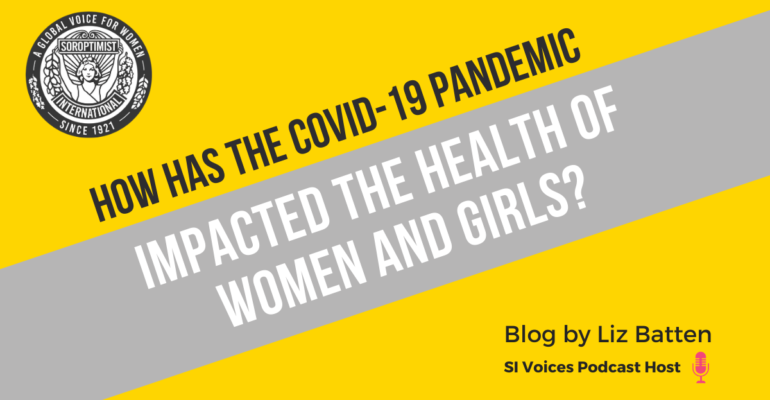Liz Batten, of SI Salisbury, continues the conversation on women and health – as discussed in her episode of SI Voices Podcast – with this blog post focusing on the effects of the COVID-19 pandemic.
“The COVID-19 pandemic is not over yet. As we are constantly being reminded, it is not over for any of us until it is over for all of us. Living together on this fragile planet, we have watched COVID-19 cases increase and decline in different parts of the world, only to see further waves of the pandemic sweeping across continents. It might be appropriate to pause and take a look at how the COVID-19 pandemic has impacted women and girls in particular.
The pandemic has been devastating worldwide, on men, women and children. Some parts of the world are suffering more than others and some countries still have a long way to go before they fully emerge from the worst of the health crisis. As a result, men, women and children have all suffered in different ways.
Women have taken their places at the front line of this pandemic, as they make up around 70% of the health and social sector workforce globally, exposing them to the virus as they tackle the pandemic on the front lines. We also know that women are frequently, and more often, the informal caregivers in the home and the community – and often unpaid or very poorly paid. In fact, women perform three times as much unpaid care work at home as men do and proportionately carry out more domestic chores and nursing sick family members, which of course exposes them to greater health risks. There has also been a lack of attention to female health workers’ specific needs beyond PPE including, for example, menstrual hygiene and psychosocial support.
The pandemic has had huge impacts in humanitarian and fragile settings and on human rights. We know that disruptions to critical health, humanitarian and development programmes can have life and death consequences, especially for pregnant women and those with newborn children. The shift to online discourse risks narrowing the space for women’s civil society organisations to operate and to undertake urgent advocacy and service delivery in support of women’s rights.
This is no more evident than in the case of gender-based violence inflicted on women and girls. Imagine being locked down (literally) within the same household as your perpetrator who holds coercive control over you, and not even able to escape to go to work or to visit family or friends. The physical and mental pressures are immeasurable. Judiciary, police and health services that usuaully are first responders for women fleeing domestic violence, have been overwhelmed and many refuges were also ‘locked down’ to entrants. It therefore became extremely difficult for women in this terrible situation to contact support services or seek help.
Organisations working in this sector have had to react quickly to provide new and innovative help and means of contact. In the UK, ‘Ask for ANI’ has emerged – a system where women can ask for help to escape domestic abuse from a pharmacist discretely. The new Lila.help service is an online directory of helplines, support services and women’s refuges worldwide being established by the Global Network of Women’s Shelters with funding from UN Women, Orange the World and some crowdfunding.
We might have thought that lockdowns all over the world might have slowed – or even helped to end – the practice of female genital mutilation (FGM), but this is far from the case. Girls kept home from school as a result of restrictions have suffered mutilation and much of the good work of educational campaigns aimed at ending the practice, has been halted.
Soroptimists all over the world have been active in their communities throughout the pandemic.
- They have been masking face masks, scrub uniforms, scrub bags, and other emergency items.
- They have been delivering food parcels to people in isolation, collecting and delivering prescriptions and medications, helping to staff helplines.
- They have been helping local refuges with funds, supplies or hands-on help in support of migrants, displaced people, refugees or women escaping domestic abuse.
- They have been supporting local food banks with funding, supplies and volunteering.
- They have been working to help both young and older ‘digitally excluded’ people get online by donating IT equipment and providing support.
- They have been helping to steward at testing and vaccination centres.
- Those who are working in the healthcare sector have been hugely busy and some of those who have recently retired have returned to duty either as volunteers or as additional staff.
Beyond the immediate issues of the pandemic in our own areas of the world, we have another serious issue to address. As a result of the pandemic, the global gender gap has widened by almost 0.6 percentage points in 2021 compared to the previous edition of the index. On the current trajectory, it is estimated that it will now take 135.6 years to close the gender gap worldwide. The top four countries in the index all have female leaders (Iceland, Finland, Norway and New Zealand (and 5 of the top ten countries are led by women).
We have a lot of work to do, but alongside other women’s organisations worldwide, we need to take our places at the decision-makers’ table and make sure we ‘build back better’ once this pandemic is truly over.”
Click on the microphone to hear Liz Batten host the SI Voices episode, “Women and Health: In Conversation with Past International President, Jane Zimmerman” on the SI Voices Podcast page.


